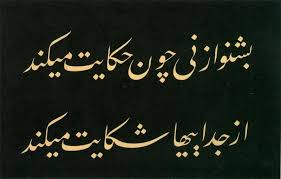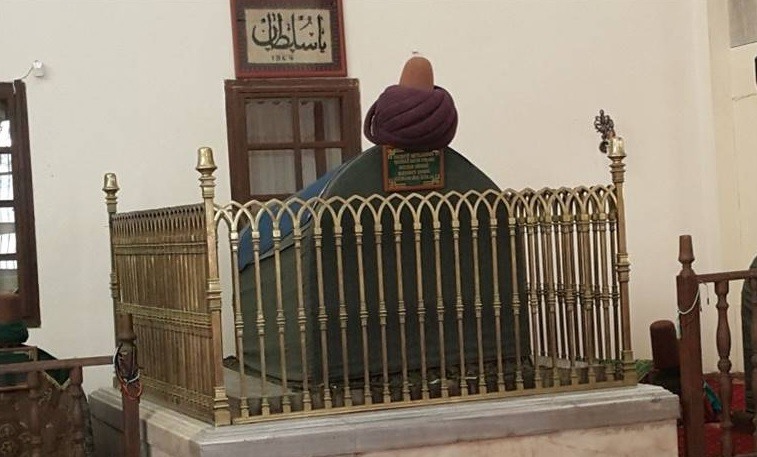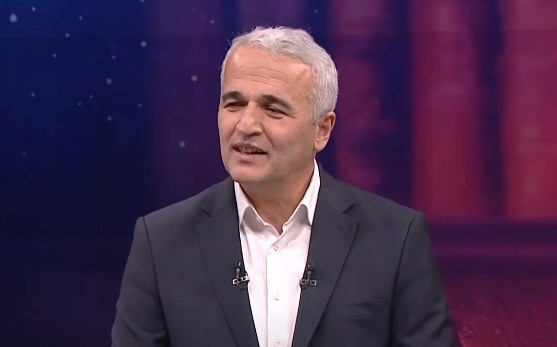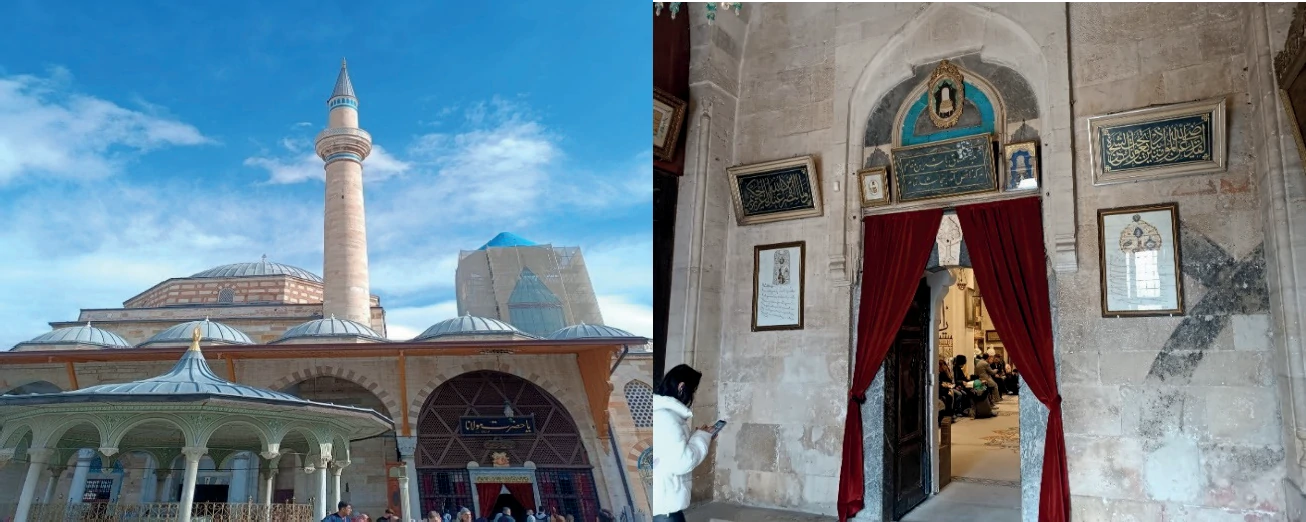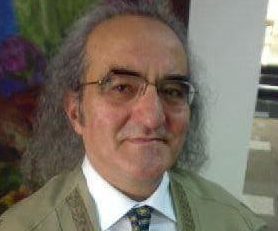Clues of Happiness in Rumi”s Masnevi – Erkan Türkmen
Clues of Happiness in Rumi”s Masnevi
Erkan Türkmen
Mevlana Jelal al-Din Rumi was a Sufi (Islamic mystic) poet. Sufis use metaphorical and highly subjective terms, which most of the time mislead a translator or interpreter. They use ambiguous language because they speak about divine wisdom that exists beyond this physical time and space. They pass through the language of music onto the mute language of heart. Rumi also wrote his Masnevi in a mystical language. When Masnevi traveled through Iran towards India, it underwent some changes in terminology and, naturally, in interpretations (for this see my article published in the Islam and Modern Age, February 2005, New Delhi, India).
Masnevi is an indirect commentary of the Holy Quran as said by Molla Abdurrahman Jami. However, it is interesting to notice that even the Quranic commentaries differ from person to person and from language to language. Let us take one simple example of the Sure “Ishrah” (94) to explain the matter:
Addressing to Muhammed (P.U.) God says, “Alam nashrah laka sadrıq” =haven”t we opened (extended or even dissected) your breast. In some commentaries it is translated literarily as “Haven”t we dissected your chest” and a further explanation is added that angels dissected Muhammed”s chest and washed it with pure “zam zam” water before taking him to Miraj (the spiritual Ascention). However, when we come across a similar Quranic verse elsewhere, “Kala Musa Rabbi ashrah li sadri” = Moses said to God, “My Lord open my chest”, we understand the real meaning of the idiom as “to open a chest” that is to fill chest with knowledge, because prophet Moses was fond of knowledge. It is for the particular reason that those who were not Sufi failed to understand even the first eighteen verses of Rumi”s Masnevi properly. As Rumi says in his sixth verse:
هر كسى از ظن خود شد يار من از درون من نجسد اسرار من
(Everyone became my friend according to his faculty of conception; but a few sought for my real inner secrets).
Nevertheless, to discover these secrets one needs universal intellect. Once you discover the universal wisdom, you enjoy every bit of divine manifestation and creation, which should be the target of a perfect man on earth. He should seek God in all religions, science and all sorts of creations regardless of discrimination. The worldly worries should no longer bother him because he enjoys God”s protection as God says in the Quran, “Surely, on the friends of God there is no fear nor shall they grieve” (10/62).
In his 15th Verse Rumi says: “Along with our sorrows we have lost the concept of time. If the days have passed away let them do so, there is nothing to worry; but You the Purest One(God) stay with me”. He continues elsewhere, “My Lord, there are hundreds and thousands of traps and snares in this life; and we are like greedy and hungry birds, although we may look strong like hawks, but we fall in traps again. Every time we fall, You protect us and set us free” (1/374-75).
Here are other clues that lead us to God”s protection and save us from the traps of worldly worries:
1- Knowledge:
Discover through the mundane knowledge that there is an ocean of divine knowledge beyond to help us. Very first line of Rumi”s Masnevi teaches the idea that God”s breath is within us by using the analogy of Nay (Reed Flute).
بشنو اين نى چون شكايت مى كند از جدا ئها حكايت مى كند
“Listen to this flute, while it”s complaining,
The story of separation it”s explaining”.
The flute is the body of man and the breath blown into it is the breath of God as He says in the Quran, “Va naffkahtu fihi min ruhi” = I breathed into man of My Spirit”. It is this part of God that we can discover and feel within us. Once you begin to feel His breath in you, your fears disappear, and great divine secrets begin to reveal on you. Idea of God may not please some as Rumi says:
هر كه جز ماهى ز ﺁبش سير شد هر كه بى روزيست روز د ير شد
“Whoever is not fish, can soon be fed up of sea water; whoever has no job or daily provision has difficulty with passing time”.
Here “Fish” means a lover of God, who after being in the divine ocean of wisdom is never fed up with God by watching endless stages; while he who has no will to discover Him may look happy outwardly but inside he is like a wretched, jobless man (a man with no great aim). Man of God sees every phenomenon with the light and guidance of God. Again, Rumi says:
“The outer light comes from the sun and the star (Suha), while the inner light reflects from the inner divine light. The light that enlightens the heart is the light of God, which is different from the outer light of intellect and senses. Every object is known by its opposite. God has given us grieves to appreciate pleasures. Since, God has no opposite, it is not possible to see Him physical eyes in this world of forms” (M. I/ 1127-).
Therefore, we should try to eradicate the physical impacts by lessening our desires and by opening our eyes to the non-dimensional world as Rumi says:
“He who is awake to this world is actually more asleep, his wakefulness is worse than his sleep. When our soul is not awake with God, our wakefulness is like being in a prison” (M.I/ 409-410). When we wake up spiritually, we pass behind these worldly shapes as Rumi says, “If you, my beloved friend, pass beyond these physical shapes, you can discover other gardens and paradises after paradises”. That is when we submit our individual intellect to divine wisdom; we begin to see what others cannot perceive. To explain this Rumi tells us these stories:
The Story of Elephant:
“Some Indians brought an elephant to a village to show it to the people. The elephant arrived at night and the people because of curiosity did not wait until next day. They went right in where the huge animal stood. Since it was dark, they began to touch the animal by their hands. The one who touched the trunk of the animal said, “Oh! It is like a water pipe”. The other who touched its legs said, “No, it is like a great pillar”. The third one touched elephant”s ears and said, “My Lord! It is like a large fan”. Had they lamps in their hands they would see the animal in full. Those who have divine light with them see what common people cannot.
A Camel and a Mule:
A mule once said to a camel, “How can it be that you rarely come in front of the caravan while I am always forced to walk in front?” The camel replied, “Well my dear, I am courageous and I have a long neck and a high head and two sharp eyes which make me see far enough tracing out slopes and sharp bends”.
In the above story camel is the man with divine wisdom who can climb up the spiritual stages cautiously.
Knowledge should be acquired not for physical gains but for the universal wisdom. As Rumi suggests:
“The whole world is full of charming forms and shapes while its essence lies in knowledge, he who seeks wisdom becomes the source of wisdom (the universal intellect) himself and that frees him from the confusing learning and reasoning of this world” (I / 1030 and 1063) and,
علم چون بر دل زند يارى بود علم چون بر تن زند بارى بود
“Knowledge when applied to soul (heart) is a good friend,
When applied to the physical body it is a burden to the end” (M I/ 3447)
Knowledge then should be directed to discover God”s soul in you, and to do that one must kill these four birds:
“Cut off these four bird”s heads: duck is greed and cock is the lustful fire;
Peacock is show and pomp, while crow is your strong egoistic desire” (M. V/ 41-43).
Do not trust your opinions until they are strengthened by true knowledge:
“Opinion has one wing while knowledge has two; skepticism and opinion hinder your flight, when you eliminate opinion you gain knowledge and thus your opinion obtains two wings to fly” (M. III/ 1511-14)
“Partial intellect is shadow of God, while God is the sun,
How can a shadow shine in front of that Glorious sun? (M.IV/ 2111).
2- Why do we have trouble and worries?
It should be realized that all worries and troubles that we have are due to our own strong egos and impatience:
“All these worries and sorrows that we suffer from are due to our heat of vain desires and dust of our existence. Each pain is a piece of death; try to get rid of it if you can, and if you cannot, the whole lot will be poured out on you. If the part has become sweet for you then God will change the whole lot (death) also sweet for you” (M. I/ 2296-98).
Another reason for our worldly worries and sufferings is to take out dross from the silver (M I/ 232) and purify our souls before returning to our Origin. In order to decrease our worries Rumi advises these:
بند بگسل باش ﺁزاد اى پسر چند با شى بند سيم و بند زر
گر بريزى بحر را در كوزه ى چند گنجد قسمت يك روزه ى ؟
“O my son! Be free and break away from the physical ties,
For how long will silver and gold keep deceiving your eyes?
If your jar of needs is dipped in an ocean,
It can take no more but a day”s need to provide”. (I/ 19-20)
And:
“A worldly man is like an embryo,
And God like a nurse wants to pull him out,
He sticks to his mother”s womb for fear and doubt,
He is afraid to loose the safety he had in his old house,
Although outside there is real life and richer foods” (M/III. 3964-65).
Many rich people find this world safe and stick to it while there is better life to discover beyond this body.
3- Avoid bad companies:
دوستى هرگز مكن از يار بد يار بد بد تر بود از مار بد
مار بد تنها ترا بجان زند يار بد بر جان و بر ايمان زند
“A bad friend is worst than a snake,
A snake bites and kills your body,
While a bad friend kills your body and faith (M.V/ 2634-2635).
4- Love:
It is the universal love of God that teaches man to love and devote himself to His creatures, regardless of any discrimination; and enables him to surrender to the universal fate (Qadar-I kul). The first step in love is to respect and gain fine manners (so called “Edeb” in Arabic) as Rumi says:
“From God we should seek for His grace to grant us fine manners because an ill mannered is deprived God”s mercy. Disrespect does not only harm the man but it also puts the whole universe on fire” (I/ 78-79).
However, real (immortal) love does not depend on colours and beauty of this mortal world.
“The love that depends on colours and shapes of this world is by no means a true love; it finally ends up in disgrace” says Rumi (M I/ 205) It is the universal love of God that is eternal and takes us to the immortal face of God. As the Quran says, “Kuli shey halikun ila wachu= All shall perish except His Face (eternal beauty)”. All the upheavals and storms in the universe are due to love. Atoms seek atoms, galaxies chase galaxies and man seeks His Breather. Once man has discovered his Beloved, he breaks away all the ties of this world and finds utmost peace and pleasure with Him:
ملت عشق از همه ملت جداست عاشقانرا ملت و مذهب خدا ست
“The nation of love is different from all other nations; their nationality and religion is only God” (M II/ 1770).
To throw light on this subject Rumi tells the story of grapes and four friends:
A certain man gave a dirham to four persons. One of them, who was Persian, said to them, “I want to buy Angur” The second one who was Arab said, “No I want to buy Unab not the Angur” The Turkish man said, “I want neither Angurnor Unab but I want to buy üzüm.” The fourth man, who was Greek said angrily, “These all sound non-sense to me, I must buy Strafili” They all wanted the same thing but were ignorant of each other”s language. If an esoteric master were there, he would say, “Don”t fight, you all need grapes in your languages, give me the money and I shall buy them for you”. Now God is the same God even if you call Him Bhagwan, Khuda, Rabi, Deus, Tangri or Bog.
Lovers of God love everyone for sake of their Beloved, Who is “Wadood”, they forgive others because their Beloved is “Forgiver”. They cover up others sins for their Beloved is “Sattar”(the Coverer) and so on. They paint themselves with the paint of God (His Esma ul Husna). To deserve God”s love we must put on some of His epithets. Otherwise, how can true love flourish between God and his lover (man)?
I want to end up my speech with Rumi”s this verse that I found placed in a separate rubric of his Masnevi:
گر با همه اى بى منى بى همه اى ور بى همه اى چون با منى با همه اى
“If you are with everyone without Me, you are with none,
If you are with nobody but with me, you are with everyone”.
Prof.Dr. Erkan Türkmen
NEU North Cyprus.



